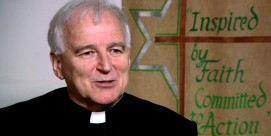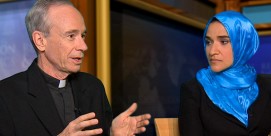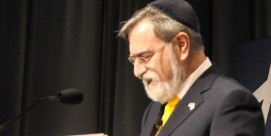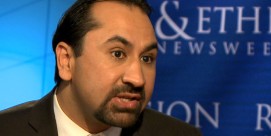Civil Liberties
BOB ABERNETHY: Attorney General John Ashcroft says, since September 11th, 650 people have been detained by law enforcement officials in their stepped-up effort to prevent more terrorism.
Meanwhile, as Congress worked on the antiterrorism bill, proponents argued that the FBI and police need new tools to keep up with modern technology, such as e-mail and cell phones; others expressed concern about violating privacy and other rights. Lucky Severson reports on the new search for the right balance between national security and civil liberties.
LUCKY SEVERSON: Federal agents, at work on the trail of suspected terrorists — a scene that has been repeated hundreds of times since September 11th. And one that will be repeated again, if Congress passes new antiterrorism legislation urgently requested by Attorney General John Ashcroft.
JOHN ASHCROFT (U.S. Attorney General): When circumstances require us to use the full force and effect of the order, we will do so. I make no apology.
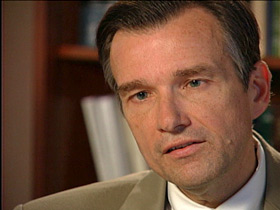
SEVERSON: The legislation gives the government expanded authority to detain immigrants and monitor phone calls and e-mail within the U.S. The legislation is aimed at terrorists, and its supporters say it will make America safer. Douglas Kmiec is dean of the law school at Catholic University.
DEAN DOUGLAS KMIEC (Catholic University Law School): We need this legislation because our existing laws have not kept up with technology and the methodology that terrorists use to communicate with one another. If we don’t have laws that match the nature of the threat, we are merely inviting more harm to come in our direction.
SEVERSON: Constitutional law expert David Cole is part of a broad coalition of groups, ranging from the ACLU to the conservative Free Congress Foundation. They argue that the legislation has been rushed through Congress and infringes on our civil rights.
DAVID COLE (Georgetown Law School): I think you should be concerned for a variety of reasons. First of all, a number of provisions that the government is seeking would potentially radically reduce the privacy of all of us.
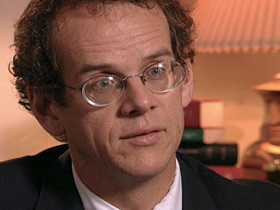
SEVERSON: The legislation makes it easier for the government to monitor e-mail communications and Web site use.
MR. COLE: The concern here is that the address information of both e-mails and Web surfing may include content. Where a phone number doesn’t include what you were talking about on the phone, but an e-mail address, if it includes the “re:” line, may include content.
DEAN KMIEC: I don’t think anything on the face of these statutes compromises our civil liberties. But here’s where a lot depends on the prudential judgment of the men and women given the responsibility to administer it.
SEVERSON: The law would allow so-called “roving” wiretaps, tracking an individual from one phone to the next. It would also allow more information sharing among law enforcement agencies.

Just a year ago, Americans were worried about losing their privacy. But then after September 11, over 70 percent said they were willing to forego some of their personal freedoms.
LOUISE MURRAY: If you’re not doing anything wrong, then what have you got to hide?
RUTH BARATTO: In fact, we had our purses checked, even our wallets checked, to get into the museum, and we said, “Thank you.”
SEVERSON: But many people are torn.
RON LAMBERT: I have mixed emotions. I don’t care for Big Brother looking over my shoulder, but when you have an incident like this, obviously you need to take measures that address that.
MITCH BROWN: I think the government is too intrusive already. I mean, I think that we’ve given up, you know, enough of our rights. You know — where is it going to end?
DEAN KMIEC: I think this legislation will help us have a proportionate response to the September 11th terrorism. I think it will facilitate our ability to track them down and either apprehend them or to deal with them by military means. And I think that is important from the standpoint of the moral and legal position of the United States.
MR. COLE: I have not heard anyone make the case that the reason we missed the September 11 attack, that the intelligence community entirely missed that attack, was because they lacked sufficient authority.

SEVERSON: Critics say the government already has considerable latitude and resources to track criminals and suspected terrorists, with court approval. E-Z pass records at tollbooths helped investigators reconstruct the moves of two hijackers. ATM machines provide electronic evidence, along with surveillance cameras, that can now be fitted with the new and controversial face recognition software. Investigators can locate cell phone users within a few blocks, and access voice mail messages from the phone company. And the FBI can eavesdrop on the Internet.
MR. COLE: I think we obviously need to rethink our security concerns … but in doing so we should not overreact as we so often have in the past. We should not sacrifice our freedoms as we so often have in the past.
SEVERSON: Critics say history shows that the U.S. almost always overreacts to a national crisis, and innocent people suffer in the name of national security. They are detained, deported, imprisoned — and often without ever being charged.
VICKI LAMBERT: What we did at the last war with the Japanese was unbelievable. … You can’t believe that we could do that in this country. And yet you can kind of begin to understand a little bit of the mindset.
MR. COLE: In World War I we authorized the detention and criminal prosecution of anyone who spoke out against the war. McCarthy era and the fear of communism, we authorized guilt by association, and particularly against immigrants. We’re seeing the same thing today.
SEVERSON: After the Oklahoma City bombing, Congress passed antiterrorism laws that targeted immigrants, not white supremacists, as you might imagine. Critics say it is happening again with legislation that allows the detention of immigrants for seven days without being charged. The new law allows detention for seemingly unrelated offenses.
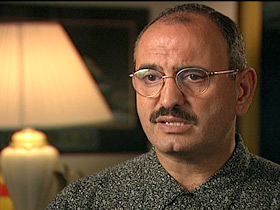
MR. COLE: It doesn’t really matter whether the government wins or loses on the charges that it files; it can continue to detain any immigrant who[m] the attorney general has reasonable grounds to suspect may have engaged in any minor crime of violence.
SEVERSON: David Cole thinks the old law is bad enough. He has represented 13 immigrants, like Michel Shehadeh, who have been jailed on secret evidence, and in every case the government has lost.
MICHEL SHEHADEH: Agents, more than ten, were hiding behind the bushes around the house … walked into the house with their weapons drawn.
SEVERSON: Michel Shehadeh, a Palestinian, was arrested in 1987 by INS agents, charged under a McCarthy-era law with belonging to an organization that advocates worldwide communism.
MR. SHEHADEH: They told me I was being arrested because I am a terrorist or belong to a terrorist organization. No more details. They didn’t read me my rights or anything.
SEVERSON: He was held in prison for 23 days. Eventually he won the case, but the government has continued to prosecute him on different charges for the last 15 years.
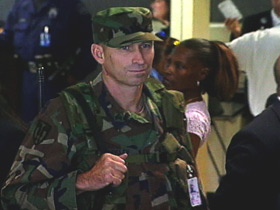
MR. SHEHADEH: Most people understand the American dream of having a car, having a house. My American dream is to be able to express myself, to be able to cherish my freedom. … That’s my American dream.
SEVERSON: As law enforcement officials continue investigating possible acts of terror, the hard part, it seems, is to find the balance between keeping us safe from terrorists, and from laws that might go to far to protect us. For RELIGION & ETHICS NEWSWEEKLY, I’m Lucky Severson in Washington.

